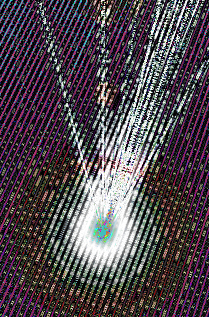Tiny colours bring gold
 The Nobel Prize in Chemistry 2023 has been awarded “for the discovery and synthesis of quantum dots”.
The Nobel Prize in Chemistry 2023 has been awarded “for the discovery and synthesis of quantum dots”.
The prize is jointly awarded to Moungi G Bawendi from MIT, Louis E Brus from Columbia University, and Alexei I Ekimov from Nanocrystals Technology Inc.
Quantum dots are minuscule wonders that have opened doors to a colourful world of nanotechnology applications.
So tiny that their size dictates their characteristics, quantum dots illuminate our lives in many ways. From enhancing the visuals on screens to aiding surgeons in tumour removal, the particles have ushered in a new era.
In chemistry, an element's properties depend on its electrons. However, when materials are miniaturised to the nanoscale, quantum phenomena emerge, governed by size rather than electron count.
The 2023 Nobel Laureates have harnessed these phenomena by creating quantum dots, playing a pivotal role in nanotechnology.
“Quantum dots have many fascinating and unusual properties. Importantly, they have different colours depending on their size,” says Johan Åqvist, Chair of the Nobel Committee for Chemistry.
Until the 1980s, the concept of size-dependent quantum effects in nanoparticles existed in theory but seemed nearly impossible to realise. This was until Alexei Ekimov was able to quantum effects in coloured glass, and Louis Brus later demonstrated size-dependent quantum effects in particles suspended in a fluid.
In 1993, Moungi Bawendi revolutionised quantum dot production, yielding nearly perfect particles crucial for practical applications.
In the future, quantum dots will continue to transform various aspects of our lives, from flexible electronics to ultra-thin solar cells and encrypted quantum communication.
The potential of these tiny particles is only beginning to be explored, promising a technicolor future in nanotechnology.
The detailed scientific background for this year’s prize is accessible in PDF form, here.








 Print
Print